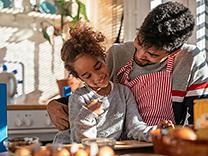Watch out for this hidden risk in the kitchen
(NC) Many people know about the risk of illness when consuming raw dough or batter that uses raw eggs. Did you know that consuming raw flour can also be risky? Flour can be contaminated with harmful bacteria such as E. coli and should only be consumed once cooked.
Although licking the cookie dough or the chocolate cake mix can be tasty, it's really not worth the risk because eating even a small amount of contaminated flour can make you sick. Flour is a raw ingredient that should be consumed only after being cooked. Eating uncooked flour contaminated with E. coli can cause an infection. Symptoms can include stomach cramps, diarrhea and vomiting. E. coli infections can be serious enough to require hospitalization.
Most at-home chefs know that flour gets almost everywhere in the kitchen. But if that flour is contaminated with E. coli, your hands and other surfaces that come into contact with it can be contaminated too. You should handle raw flour no differently than you would handle raw meat.
While anyone can get an E. coli infection, pregnant women and young children ages five and under are among those most at risk to develop more severe health problems, including kidney failure, seizures and stroke. Although rare, death can also result from an infection.
Here are some tips for cooking with flour:
In order to prevent cross-contamination, keep raw foods, including flour products, separate from other foods when you cook.
• Use separate bowls, measuring cups and utensils to keep flour, raw dough and raw batter separate from ready-to-eat food.
• Do not add flour to foods that will not be cooked, such as milkshakes and ice cream mixes.
• Bake or cook items containing flour, including flour used for thickening.
• For products such as cake mixes, follow package directions for proper cooking temperatures and specified times, as these may contain raw flour.
Comments
There are 0 comments on this post





